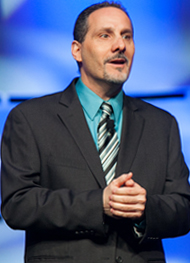NAFA CEO Phil Russo, CAE: I Hope To Serve You Well
 Print this Article | Send to Colleague
Print this Article | Send to Colleague

The recent visit to the U.S. by Pope Francis got me thinking about what I could learn from this man in terms of how to be a leader.
Watching tens-of-thousands of people screaming the Pope’s name, clamoring to touch him, and stretching to snap a selfie with him, I couldn’t help but wonder what it is about this man – aside from the fact that he is at the top of the Roman Catholic church’s hierarchy – that earns him the love, respect, and adoration of millions of believers and non-believers alike.
Typically, being "the boss" doesn’t automatically earn someone the degree of adoration expressed so openly to the Pope by millions of people last week. Ask Barack Obama if he’d like that type of adoration from the American people and I think he’d sign up in a second. So it’s more than just having a position of leadership that gains someone respect or adoration.
Over the past few days, I’ve been reading a lot about the Pope’s leadership, and there certainly is no shortage of ideas or opinions on this subject. In fact, my Google search of "Pope Francis + Leadership" turned up more than 41-million results in 0.35 seconds. Amazon has more than 140 books on the leadership of Pope Francis. Clearly, people are hungry for the type of leadership shown by Pope Francis, they want to know more about it, and they want to experience more of it.

After a few hours of reading about the Pope, I realized a common theme to the majority of the opinions. Then I realized I had the answer tacked to my bulletin board all along. It’s a message I heard shortly after I came to NAFA in 2005 as Executive Director and one that has guided me every day. It says, simply:
"Leadership has nothing to do with the position, but has everything to do with the ability to serve. With the position is given a platform to serve and aggressively meet the needs of others."
That’s it. Pope Francis leads because he serves. He is not in the leadership position to thrust his will upon anyone and get people to work for him. Just the opposite: he serves his people and they want to follow him. Pope Francis is adored because he humbly serves everyone.
My hope, my prayer, every day is to serve you well.
Sincerely,

Phil

Leadership Lessons from Pope Francis
For those who want to know more about what I learned in my readings about the Pope’s leadership, below are some of the more salient points that struck me during my research. (Paraphrased from various sources, including Lead With Humility: 12 Leadership Lessons from Pope Francis.)
Lead with humility. Pope Francis believes humility is a powerful leadership quality. Leaders can follow his example of eschewing limousines, carrying his own bags, and making his own coffee.
Stay focused and consistent. The Pope’s message, over and over again, to multiple audiences, is the same and he does not go off course. Whether he was speaking to Congress or the United Nations or anyone else, the Pope stayed focused and consistent, saying mercy is the answer to dealing with all of our ills. Leaders need to know their message, believe in it with all their hearts, and never lose sight of it.
Walk the walk/talk the talk. Pope Francis models the behavior he talks about: be humble and serve. Does anything say this more loudly and more clearly than the fact that he drove around in a Fiat, with the windows down, not an armored limousine? The only way to gain credibility and trust as a leader is to do as you say and say what you mean.

Be accessible. Pope Francis literally stopped parades to shake hands, kiss babies, and touch the people who so desperately wanted to be near him. He walked among the crowds and blessed children. Leaders need to be among their followers, know them, and touch them.
Take risks. While not revising Catholic doctrine, Pope Francis has taken risks by offering new perspectives on many hot-button topics. He could have been safe and done and said things the way they’ve always been done and said, but he recognizes that change is necessary. Of course, big changes are hard to make – and they take time, money, and people to implement – but leaders need to have the courage to say and do what no one else is willing to say or do.
Value input from everyone. Pope Francis has shown he recognizes the intrinsic value of every person. He has also made it clear that he does not think he can achieve everything on his own. Leaders should approach the people in their organizations much the same. There’s real value in what your people think – especially the frontline soldiers – and it’s up to leaders to go out and seek that value, then develop it in everyone. Leaders should also look outside the organization to see if things can be done differently, seeking advice from outsiders.
But be willing to ignore advice. Pope Francis has been willing to act unilaterally to ensure his agenda moves forward. When he asked for potential names to fill the role of secretary-general, nearly 500 clergymen submitted recommendations, only one of which was for Bishop Nunzio Galantino. Francis chose Galantino anyway, because Galantino shared Francis’ views and visions. Leaders need to have strong convictions about their agenda and be willing to make tough decisions.
Back to NAFA Connection


